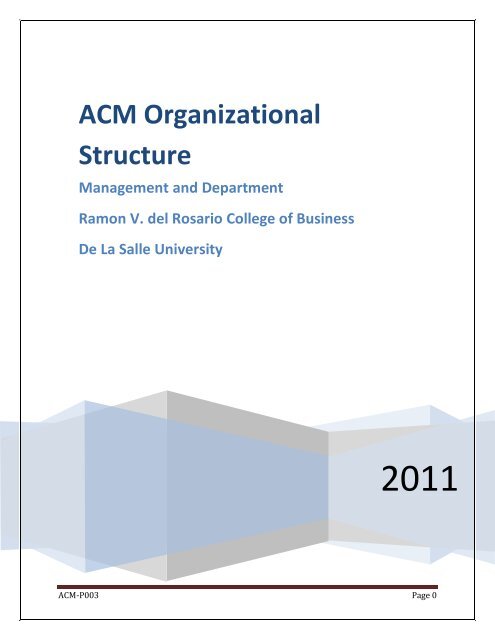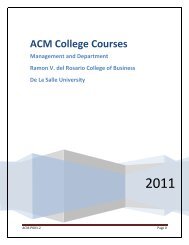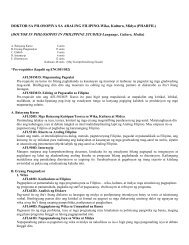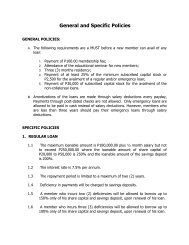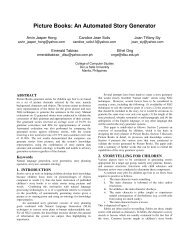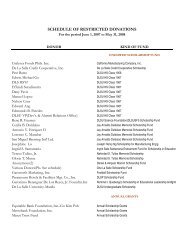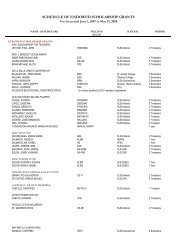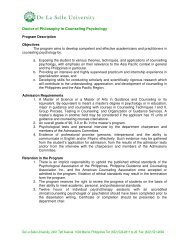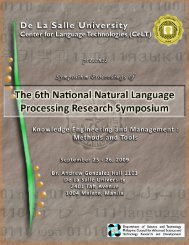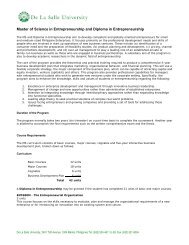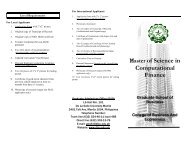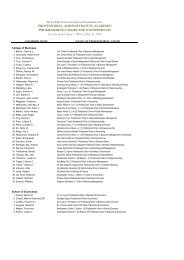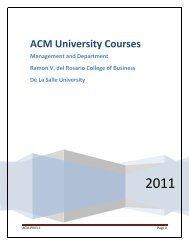ACM Organizational Structure - De La Salle University
ACM Organizational Structure - De La Salle University
ACM Organizational Structure - De La Salle University
You also want an ePaper? Increase the reach of your titles
YUMPU automatically turns print PDFs into web optimized ePapers that Google loves.
<strong>ACM</strong> <strong>Organizational</strong><br />
<strong>Structure</strong><br />
Management and <strong>De</strong>partment<br />
Ramon V. del Rosario College of Business<br />
<strong>De</strong> <strong>La</strong> <strong>Salle</strong> <strong>University</strong><br />
2011<br />
<strong>ACM</strong>-P003 Page 0
1.0 <strong>De</strong> <strong>La</strong> <strong>Salle</strong> <strong>University</strong><br />
The Brothers of the Christian Schools (FSC) founded DLSU in 1911. It has transformed<br />
from an all boys school to an inclusive co-ed multiversity. The <strong>De</strong> <strong>La</strong> <strong>Salle</strong> Philippines Inc. is<br />
the umbrella organization that supervises 17 <strong>La</strong>sallian schools catered to students of different<br />
backgrounds, thus fulfilling the mission of St. John Baptist de <strong>La</strong> <strong>Salle</strong> to educate even the poor.<br />
DLSU is governed by a Board of Trustees (BOT) composed of <strong>La</strong>salle brothers and<br />
respectable members of industry. Its central administration is led by the President and<br />
Chancellor. Directly reporting to the chancellor are the Vice Chancellor for Academics, Vice<br />
Chancellor for Research, Vice Chancellor for Administration, Vice Chancellor for <strong>La</strong>sallian<br />
Mission and Alumni Affairs, Executive Vice President for Finance, Executive Vice President for<br />
External Relations and Internationalization.<br />
Under the supervision of the Vice Chancellor for Academics are eight Colleges and one<br />
School. These are the Ramon V. del Rosario College of Business, College of Computer Science,<br />
College of Education, College of Engineering, College of <strong>La</strong>w, College of Liberal Arts, College<br />
of Science and School of Economics. Each college has several departments and each department<br />
will have its own degree programs.<br />
2.0 Ramon V. del Rosario College of Business<br />
In July 25, 2011, the university launched the Ramon V. del Rosario College of Business<br />
(RVR-COB), the first named college in the history of the university. The RVR-COB traces its<br />
history from then College of Commerce and Graduate School of Business.<br />
The College of Business and Economics (CBE) evolved from the College of Commerce<br />
that was established in 1960. In November 2009, the DLSU Board of Trustees approved the<br />
separation of the SOE from then CBE effective AY 2010-2011. This gave rise to the College of<br />
Business (COB) intended to become the premier business school in the Philippines.<br />
The graduate programs in business were previously managed by the College of Business<br />
and Economics, under the Graduate School of Business (GSB). The graduate school was later<br />
spun off into a separate entity known as <strong>De</strong> <strong>La</strong> <strong>Salle</strong> Professional Schools Inc (DLS-PSI). The<br />
school was renamed Ramon V. <strong>De</strong>l Rosario Sr (RVR) Graduate School of Business after<br />
receiving an endowment from the family of Mr. <strong>De</strong>l Rosario, a man committed to nation<br />
building. However, effective AY 2009-2010, the graduate school was reintegrated into <strong>De</strong> <strong>La</strong><br />
<strong>Salle</strong> <strong>University</strong> with academic programs under the direct supervision of then Business<br />
Management (BM) department. Under a multi-disciplinary approach to graduate education, the<br />
course offering of the graduate programs were spread through the different departments of what<br />
is now known as the COB.<br />
<strong>ACM</strong>-P003 Page 1
There are six departments under the RVR-COB. These are Accountancy, Commercial<br />
<strong>La</strong>w, <strong>De</strong>cision Sciences and Innovation, Financial Management, Marketing and Advertising, and<br />
the Management and Organization <strong>De</strong>partment (MOD). Each department is headed by a<br />
Chairperson and assisted by a Vice Chairperson and Graduate Studies Coordinator, depending on<br />
the number of programs and students supervised.<br />
3.0 Management and Organization <strong>De</strong>partment<br />
The establishment of the Management and Organization <strong>De</strong>partment (MOD) stems from<br />
the reintegration of the RVR Graduate School of Business into DLSU. With the transfer of<br />
academic and faculty load of the graduate program to the Business Management (BM)<br />
department, the BM department became the second largest unit in the university supervising<br />
more than 10 programs and educating more than 1,800 students at any one time. This eventually<br />
led to the splitting of the department. The creation of the <strong>De</strong>cision Sciences and Innovation<br />
(DSI) department as well as the Management and Organization <strong>De</strong>partment (MOD) was<br />
approved in the April 4, 2011 meeting of the President’s Council. In simple terms, DSI was<br />
tasked to educate students on the science of management while MOD focused on the art of<br />
management.<br />
The MOD administers three vertically integrated programs. These are the BS Applied<br />
Corporate Management, Master in Business Administration, and Doctor in Business<br />
Administration.<br />
4.0 Applied Corporate Management Program<br />
The BS Applied Corporate Management (<strong>ACM</strong>) program is a uniquely designed business<br />
program in the country. Its primary component is a 36-week internship sandwiched between<br />
academic terms. It was a program designed by industry, for industry. It takes its roots from the<br />
efforts of Mr. Henry Schumacher of the European Chamber of Commerce of the Philippines who<br />
envisioned to have business graduates who could seamlessly join the workforce upon graduation.<br />
Consequently, students gain the necessary workplace skills as well as develop the appropriate<br />
work ethic while still studying. This formula ensures that what industry needs, is what industry<br />
gets.<br />
Prior to the creation of the MOD, the BS <strong>ACM</strong> program was supervised by the <strong>ACM</strong><br />
Committee. However, since there is currently only one undergraduate program at MOD, the<br />
<strong>ACM</strong> Committee was no longer activated. Instead, the program is supervised by the <strong>ACM</strong><br />
Program Head.<br />
<strong>ACM</strong>-P003 Page 2
5.0 Internship Coordinator<br />
The defining difference of the BS <strong>ACM</strong> as against all other business degree programs in<br />
the country is its internship component. Consequently, the department has focused much of its<br />
effort in designing an internship component that benefits the students and industry. Extra care is<br />
given to prepare the students before they intern, while they are on internship, and after their<br />
internship. Control measures are in place to ensure the effective delivery of the program.<br />
The implementation of the internship component of the BS <strong>ACM</strong> program is assigned to<br />
the Internship Coordinator. It is the Internship Coordinator, who liaises between and among all<br />
stakeholders. These stakeholders are the students, the supervisors, human resource personnel of<br />
prospective and current partners, faculty internship advisers, as well as university administrators.<br />
Any matter that concerns the internship is first raised to the Internship Coordinator.<br />
6.0 Thesis Coordinator<br />
The BS <strong>ACM</strong> was initially designed to be a non-thesis degree program. However,<br />
department administrators felt that students should have a solid academic background that<br />
prepares them for advanced degrees on top of a practice-oriented background that makes<br />
students readily absorbed by industry. Consequently, students were introduced to the rigors of<br />
research.<br />
The research component of the BS <strong>ACM</strong> program is supervised by a Thesis Coordinator.<br />
It is the Thesis Coordinator who ensures that students are ready to undertake their thesis and<br />
assists them along the way until they are finally able to submit a final approved version for<br />
archiving in the university library.<br />
<strong>ACM</strong>-P003 Page 3


